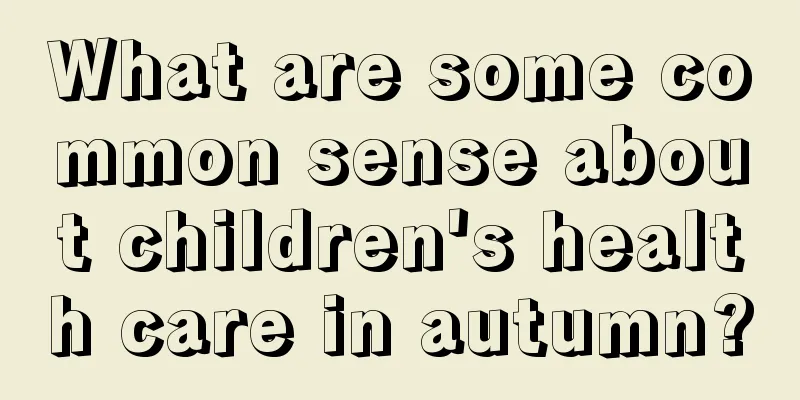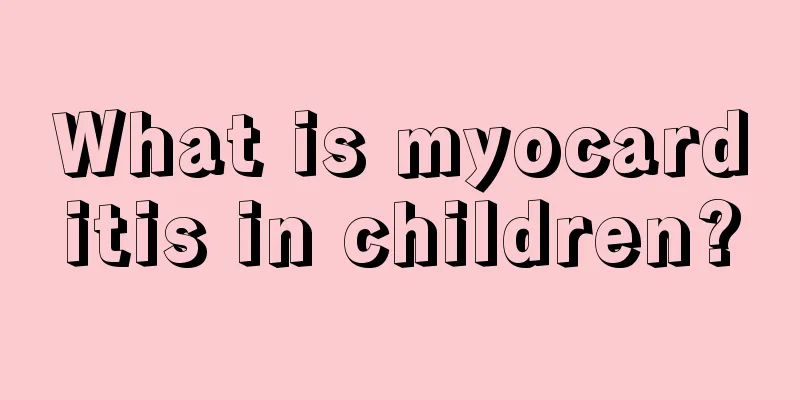Causes of yellow runny nose in children

|
Some children will have a runny nose when they are young, and they will look very dirty. Some mothers think this is normal and ignore treatment. Some children may also have thick yellow nasal discharge. In this case, mothers should pay attention, as the thick yellow nasal discharge may be caused by a cold, or it may be caused by rhinitis or sinusitis. If you find such a situation, you must seek timely treatment and not ignore it, otherwise it will cause more serious illness. Common causes of thick yellow nasal discharge in children include: 1. In the early stage of a cold, the discharge is clear watery or mucous, and purulent discharge may appear in the later stage of a cold. 2. Chronic rhinitis: The nasal discharge is mostly mucous. The amount can be more or less. 3. Allergic rhinitis: The patient has clear watery nasal discharge in large amounts, accompanied by sneezing and nasal itching. It can occur year-round or seasonally. Patients with allergic rhinitis may have asthma, especially children. 4. Chronic sinusitis, mostly with mucopurulent secretions, bilateral or unilateral, accompanied by nasal congestion, dizziness, memory loss, etc. Unilateral sinusitis should be considered odontogenic sinusitis. Nasal polyps can also cause clear watery nasal discharge, which can be accompanied by purulent nasal discharge when infected. Nasal congestion, dizziness, memory loss, etc. may also occur. 6. Children's secretions are relatively vigorous. If there is no other discomfort, it may be caused by cold air irritating the nasal cavity and no special treatment is required. Unilateral nasal congestion with blood in the mucus may be caused by foreign matter in the nasal cavity. 7. If there is yellow watery discharge, the possibility of a cyst in the sinus should be considered and a sinus X-ray should be taken. Runny nose during a cold is called acute rhinitis. At this time, the nasal mucosa becomes congested and swollen, and the increased glandular secretions form nasal mucus. It is clear water at first, and gradually turns into purulent mucus after 3 to 5 days, and can be cured after 1 to 2 weeks. If acute rhinitis recurs, the nasal mucosa will be congested, swollen or even thickened for a long time, which is chronic rhinitis, and you will often have a runny nose. If there is mucus in the nose, ask the child to blow it out by himself. The correct way to blow your nose is to hold one nostril and blow it side by side. At the same time, it must be performed when the nasal cavity is unobstructed, otherwise the mucus in the paranasal sinus will be difficult to blow out, and the purulent mucus in the nasal cavity can enter the paranasal sinus and the Eustachian tube, causing otitis media. Intranasal drops of vasoconstrictors such as ephedrine can reduce mucus, but such drugs should not be used by patients with atrophic rhinitis. When dripping medicine, prevent the liquid from flowing into the mouth, because the child will feel the bitter taste and will not let you drip medicine again. At the same time, in order to ensure that the medicine drips evenly into the nasal cavity and does not flow out quickly, the correct medicine dripping posture must be adopted. For sinusitis with excessive nasal discharge, you can go to the hospital for replacement therapy or puncture irrigation treatment. |
<<: The child has a pimple on his eyelid
>>: Symptoms of urethritis in children
Recommend
Intellectual development of 30-month-old baby
The intelligence of a thirty-month-old baby has b...
What to do if your child has a runny nose due to influenza
For inexperienced mothers, you often feel helples...
What are the symptoms of gingivitis in children?
Many parents do not help their children develop h...
How to teach children to draw?
When children are about three years old, they wil...
What are the symptoms of baby cramps?
Babies sometimes have cramps, and parents don’t k...
Can newborns sleep on bamboo mats?
The body temperature of a newborn baby is higher ...
How to treat white spots on children's feet?
Vitiligo is a very complex skin disease. There ar...
What are the symptoms of protein allergy in children?
Young children's immunity is not yet fully de...
What to do if children's tonsils are repeatedly inflamed and suppurated
Tonsillitis in children is a common disease. When...
7 month old baby food indigestion symptoms
The baby's development process requires paren...
What is the reason for the child's labored breathing?
Many parents will find that their children have d...
Introduction to childhood pneumonia
Pneumonia in children. We have introduced many is...
What is the reason for the child's yellow hair
Children's dry and yellow hair is mostly caus...
What are the methods to reduce fever in children? I recommend these six!
Once a child has a fever, he or she will become v...
Is it harmful for children to have a fever?
Many parents, when they find their children have ...









